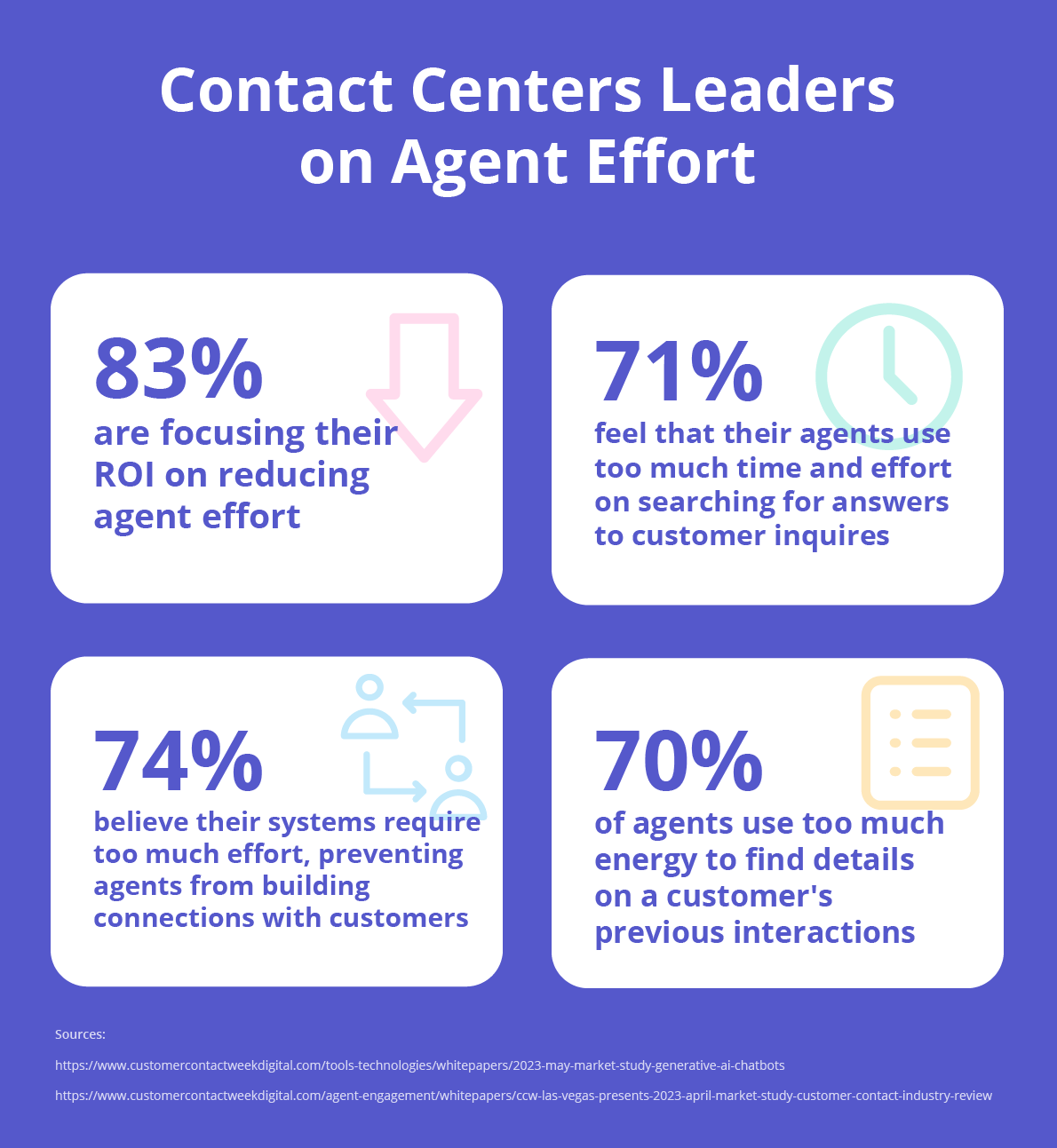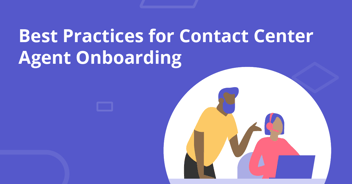Reduce Agent Effort With These 4 Strategies

Customer effort is directly impacted by agent effort.
This means that when agents experience minimal friction in their daily workflow, they can efficiently support customers and ensure optimal satisfaction. On the contrary, if agents face too many hurdles assisting customers, it creates a negative experience and leads to undesirable consequences for the contact center as a whole.
In this article, we’ll explore the impact of agent effort on contact centers and the most effective strategies to reduce it.
What is agent effort?
Agent effort is the amount of work that an agent must complete to resolve customer issues and create a positive customer experience based on the standards of the contact center.
It includes the capability to quickly and accurately provide solutions to customer inquiries, be friendly and empathetic during interactions, and stay up to date on any changes to processes and policies.
Why is reducing agent effort important?
Controls costs
For 83% of contact center leaders, a top priority in achieving a high return on investment (ROI) is to reduce agent effort. The reason behind this focus is the belief that improving agent efficiency directly contributes to better control of operational costs. When agents are efficient in their daily work, they can accomplish the responsibilities of their role using less time and resources.
Additionally, reducing agent effort results in higher job satisfaction and fewer reasons for agents to consider leaving the company. This positively contributes to the contact center’s retention rate, leading to cost savings on the recruitment of new agents.
Improves employee experience
Engagement—Agent workflow is directly related to engagement. When agents spend less time and energy on tedious, repetitive tasks and can dedicate more of their attention to customer interactions, they have a stronger sense of fulfillment in their role, resulting in higher levels of engagement.
Retention—Providing agents with seamless access to the tools and knowledge they need to effectively perform their tasks eliminates frustration and empowers them to commit to their roles long-term.
Productivity—By reducing the time and energy agents spend on contact center inefficiencies, such as outdated technology or fragmented systems, they can attain proficiency sooner, leading to a boost in performance and productivity levels.
Improves customer experience
Satisfaction—Any time that agents can save on inefficient tasks means reduced customer waiting times, faster query resolution, and shorter handling times. The result is an increase in customers satisfied with the level of service they receive.
Frictionless journey—Given the direct correlation between customer effort and agent effort, a reduction in agent effort means the customer journey will improve as it becomes increasingly more seamless and frictionless.
Personalized support—When agents have access to comprehensive customer data and insights, they can approach each interaction with a deeper understanding of the customer’s history and needs. This knowledge enables agents to personalize the support they provide and demonstrate the level of empathy and care that customers have come to expect.

How can you reduce agent effort?
Invest in automation and AI
Agents frequently encounter inefficiencies in their daily tasks, such as manual processes, time-consuming searches, and the constant need to switch between applications. The most effective strategy to reduce agent effort is to minimize or eliminate these low-value tasks by using automation and AI technology.
Agent Assist—With a staggering 71% of agents spending too much time looking for answers to customer questions, Agent Assist proves to be the optimal tool to reduce agent effort.
Powered by AI, Agent Assist eliminates the time-consuming task of searching through the knowledge base. It works by listening to customer inquiries to determine the reason for the call, finding contextually relevant information, and providing agents with accurate suggestions in real-time.
Unified Agent Desktop—Fragmented systems cause immense frustration and make it difficult for agents to deliver optimal customer service. For this reason, it is crucial to reduce the number of systems and screens that agents must navigate when interacting with customers.
Integrating agent systems into a single user interface limits the number of applications open at any given time. This eliminates the inefficiency of multitasking, enabling agents to seamlessly support customers while navigating all necessary systems within a single platform.
Implement a robust knowledge management system
A whopping 74% of contact center leaders agree that their existing knowledge base is inadequate, requiring too much effort and preventing agents from establishing positive relationships with customers.
The effort that agents use to navigate systems and search for information has a significant impact on their workflow. When agents are provided with an intuitive and user-friendly knowledge management system, it saves a significant amount of time and consequently increases their overall efficiency.
The ideal knowledge base should be cloud-based, simple to navigate, and use visual processes that transform lengthy text-based documents into logical visual guides. These essential features enable agents to easily locate accurate information, eliminating the need to search through multiple documents while facilitating quick learning and retention of necessary processes.
Optimize customer data
A striking 70% of agents spend excessive effort searching for details about a customer’s previous interaction history. Since most agents are unable to immediately access necessary customer data, it means they don’t have enough context to start a customer interaction.
When agents have insufficient access to crucial customer data, they are forced to spend excessive time searching through systems and asking repetitive questions, resulting in customer frustration and inefficient support.
To reduce the time and effort agents spend on identifying customers, customer data should be captured and analyzed. By doing so, agents can easily access customers’ complete support history, authenticate them, and personalize the interaction.
Provide regular training and coaching sessions
Inadequate training leaves agents lacking the essential knowledge and skills required for their roles, meaning they need to exert more effort to carry out their daily tasks effectively.
Agents need dynamic and personalized training and coaching sessions that cater to their individual strengths, weaknesses, and career trajectory. This approach empowers agents to retain essential knowledge and skills and reduces agent effort during customer interactions.
To build meaningful connections with customers and provide empathetic support, agents should receive training that extends beyond basic processes, encompassing soft and analytical skills.
Advanced training on new technology, product knowledge, and fraud prevention is essential to reduce agent effort and boost confidence in handling complex issues. This is especially crucial for remote agents who rely on regular feedback and support to stay abreast of company updates and changes.
Reduce agent effort in your contact center
The amount of effort that customers must exert to receive prompt and helpful support is highly dependent on agent effort. When agent effort is reduced, customers experience exceptional service.
However, the significance of agent effort extends beyond customer satisfaction; it has an impact on every aspect of the contact center—from operational costs to agent retention to the reputation of the brand.
By reducing agent effort, contact centers experience a multitude of benefits that range from an increase in efficiency to an improvement of the organization’s bottom line.


